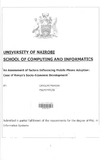An Assessment of factors Influencing Mobile Phone Adoption: Case of Kenya's Socio-Economic Development
Abstract
Using theories of technology acceptance and technology transfer, we identified factors
affecting the use of mobile phones in Kenya. We used a research model to describe
factors that impact mobile use and formulated a series of hypotheses about them. We
then surveyed mobile phone usage in Kenya and tested on the structural model to
examine our hypothesized relationships. We looked at what factors strongly influence
individuals' perceptions of the usefulness and ease of use of mobile Phones.
Although extensive mobile phone adoption (high mobile phone levels per capita) may be
necessary for seeding commercial and economic initiatives that depend heavily on mobile
phones, such as m-commerce, it may not be sufficient. Firms conducting business in
Kenya need to pay attention to the factors that explain individual mobile phones use
because these factors will most likely determine the optimal market segmentation,
business development and customer service strategies for leveraging m-commerce
operations the region.
For government units, the understanding of such factors would also be beneficial in
aiding economic planning and commerce.
From the data collected we explain how mobile phones may not just help create new
jobs and new sources of revenue to the state but can also contribute to economic growth
by widening markets, creating better information flow, lowering transaction costs, and
becoming substitute for costly transportation that is lacking especially in rural areas.
The results of the TAM survey based on the regression model with an R square of 0.273,
show that there was substantial support that the participants who found mobile phone
easy to use and useful tended to adopt and use them.
Citation
Master of Science in Information SystemsSponsorhip
University of NairobiPublisher
University of Nairobi School of Computing and Informatics

